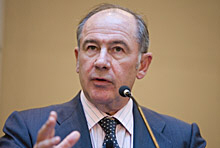
Typical street scene in Santa Ana, El Salvador. (Photo: iStock)
IMF Survey: New Framework for IMF Surveillance
June 18, 2007
The IMF's Executive Board decided on June 15 on a new framework for IMF bilateral surveillance: the way in which the Fund monitors and assesses its member countries' economies.

Managing Director de Rato announced the new bilateral surveillance framework in Montreal (photo: IMF)
BILATERAL SURVEILLANCE
In a speech in Montreal, Managing Director Rodrigo de Rato announced this decision as "good news for the IMF reform program and good news for the cause of multilateralism."
Speaking at the International Economic Forum of the Americas conference on June 18, de Rato said that the Executive Board's approval of an updating of a 1977 Decision on Surveillance over Exchange Rate Policies was the first major revision in the surveillance framework in some 30 years, and is the first ever comprehensive policy statement on surveillance.
"The new decision reflects current best practice in our work of monitoring members' exchange rate policies and domestic economic policies," he said. "It reaffirms that surveillance should be focused on our core mandate, namely promoting countries' external stability. And it gives clear guidance to our members on how they should run their exchange rate policies, on what is acceptable to the international community, and what is not."
Fourth principle
To three existing principles relating to exchange rate manipulation pursued for certain purposes, and to when and how it is desirable to intervene in the foreign exchange rate markets, de Rato said that the revised decision adds a fourth principle: "A member should avoid exchange rate policies that result in external instability."
The updating of the 1977 Decision, the Managing Director explained, was needed to address the developments that have most challenged the stability of the system in the past thirty years. Reflecting the period when it was drawn up, it focused on potential exchange rate manipulation undertaken for balance of payment reasons and on short term exchange rate volatility. By contrast, the most prevalent exchange rate related problems since then have been the maintenance, for domestic reasons, of overvalued or undervalued exchange rate pegs and, more recently, capital account vulnerabilities.
"The decision taken has very broad support, including from industrial countries, from emerging economies and from developing countries," de Rato said. "The breadth of this support is telling, because it demonstrates very broad ownership of the way that Fund surveillance will be strengthened and of members' responsibilities in the process. This decision is good news for IMF reform program and good news for the cause of multilateralism."
The new decision will sustain evenhanded treatment of Fund members, which is at the core of a cooperative institution. This progress, de Rato said, will also help the IMF move forward with the other elements of the reform program, to help the membership meet the challenges of 21st century globalization.


